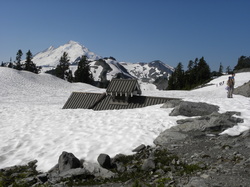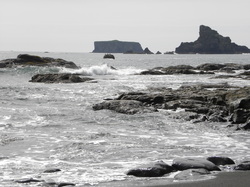I went to an avalanche awareness class last night, and while there was a lot of talk about hearing “whumps” and witnessing running cracks and generally being aware of avalanche conditions, there was also a big discussion about the human factor that causes most avalanche deaths.
The human factor boils down to basically three errors we commonly make: 1) believing that we are more skilled than we actually are, 2) not paying attention to the obvious warning signs, and 3) being so committed to reaching a pre-determined goal that we are willing to risk everything to get there.
I realized that these three potential errors apply to nearly all endeavors. They certainly do to outdoor activities that I participate in, like ocean kayaking. I remember one trip where we were going to circumnavigate an island, and we found the current pushing against us so hard that we were paddling like Olympic athletes and only progressing a few inches. After consulting each other, we did an about face and circumnavigated the island in the other direction with little problem. If we hadbelieved we were Olympic athletes or been absolutely determined to continue in the direction we had planned, we would have exhausted ourselves, potentially had a serious accident on the rocks, and still never reached our goal. So at least on that trip, my party responded correctly to all three elements of the human error factor.
Over the years, I have realized that writing is subject to these three error factors, too. As an editor, I often work with writers who believe they know more than they do. My critique partners sometimes have to remind me that I don’t know everything, too. (Sadly, they are usually correct.)
We authors sometimes don’t pay attention to obvious problems, like a majority of readers telling us that our story is slow or confusing, or that they don’t like our protagonist or that we are going to upset our readers with foul language or gratuitous violence. And we are often so committed to our goal of getting the book finished, doing everything ourselves, or writing according to our pre-planned outline that we try to force the process into the mental mold we have created. And while we may not end up buried under snow or being swept away by the current, we will probably not end up with the best story we could have written, either. It’s important to be open-minded and be willing to change direction when the situation calls for it.
So another of my 2012 resolutions is to pay attention and stay flexible so I can write the best stories, take the best publishing offers, and have the most enjoyable time both in my outdoor adventures and in my career(s), too.


